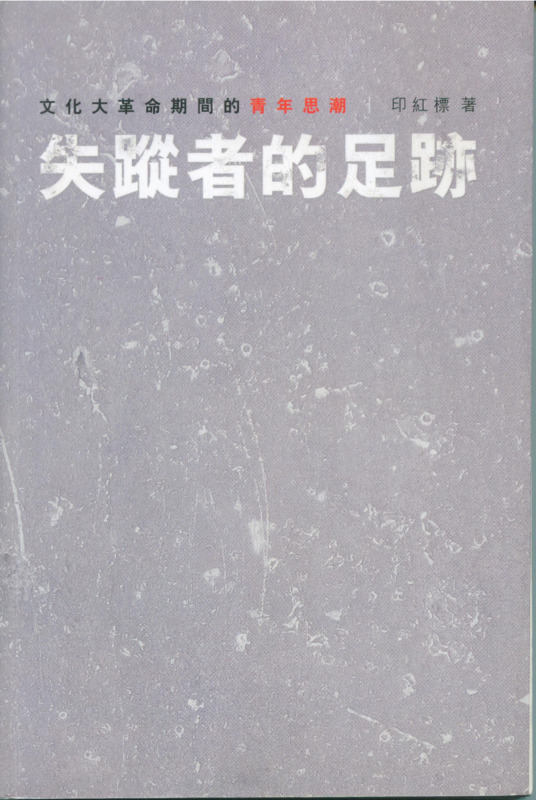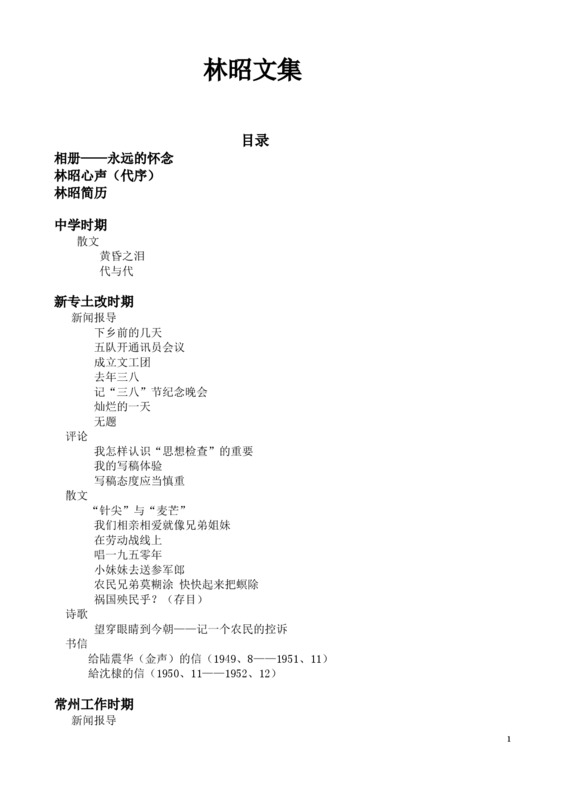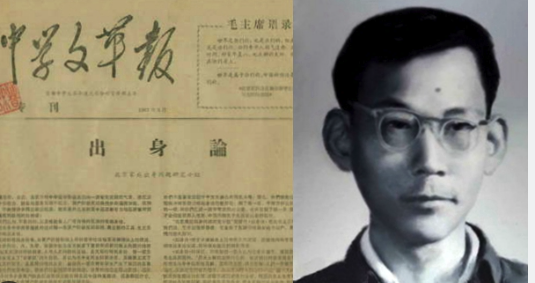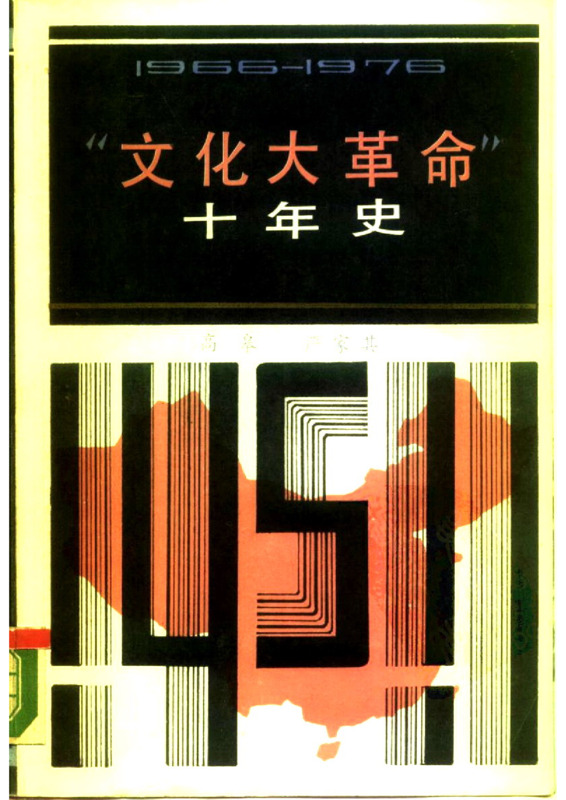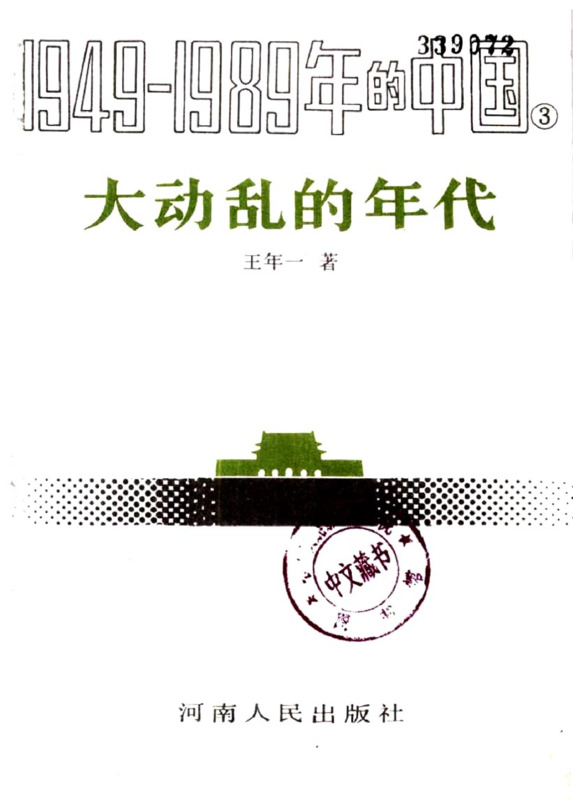Explore the collection
Showing 24 items in the collection
24 items
Book
Age of Revolutionary Revolt: Historical Manuscripts of the Cultural Revolution Movement in Shanghai, The
Shanghai is where the Cultural Revolution was launched, and the Shanghai Cultural Revolution is an important part of China's decade-long Cultural Revolution. This book is an important work about the decade-long Cultural Revolution in Shanghai. It has been commented that "Li Xun's book is the most detailed account of the Shanghai Cultural Revolution to date. Although other perspectives are possible, as far as political history is concerned, the basic framework is complete; and as far as the study and evaluation of the Cultural Revolution is concerned, the core of understanding the movement is almost lost without the Shanghai Cultural Revolution." This book was published by Oxford Press in 2015.
Here is a link to purchase the book from the publisher:
https://www.oupchina.com.hk/zh/general-interest/humanities/archives/2014/24_shanghai-cult-revolution
Book
At the Crossroads of History
This book is Gao Hua's next masterpiece after *How the Red Sun Rose*. It entails a selection of papers published by the author between 1988 and 2004, covering the fields of Republican history, Communist Party history, and contemporary Chinese history. It captures the historical interaction between the present and the past. Gao reflects deeply on the far-reaching Chinese Communist Revolution. With a rigorous and empirical research methodology, he sketches a complex and colorful picture of history, presenting the multiple facets of twentieth-century China's history.
Book
Blood Letters: The Untold Story of Lin Zhao, A Martyr in Mao's China
This book is the brainchild of Prof. Lian Xi of Duke University, U.S.A. In March 2018, it was published in English by Basic Books in the U.S.A. In 2021, it was published in Chinese by Taiwan Business Press. Based on a large amount of historical materials as well as first-hand interviews, this book reconstructs Lin Zhao's life. It depicts the political development before and after the birth of New China, and presents the resilient will and beliefs of intellectuals in this era.
To purchase this book, please visit [the publisher](https://www.hachettebookgroup.com/titles/lian-xi/blood-letters/9781541644229/?lens=basic-books), or a bookseller.
Book
Footprints of the Missing: Trends of Youth Thought During the Cultural Revolution
During the ten years of the Cultural Revolution, ideological control was extremely harsh. However, a small group of young people at great personal risk still carried out extremely serious study and thinking.
This book is a study of this group of young thinkers. Written by Yin Hongbiao (b. 1951), a professor of history at Peking University, it examines the lives and motivations of some of these contrarian thinkers. Instead of focusing on well known thinkers from the Cultural Revolution, such as Yu Luoke, Professor Yin seeks to rescue "missing persons" from history. These are not mainstream public intellectuals, but grassroots thinkers who challenge the mainstream. In this book, they include people such as Chen Erjin, a young man from the mountainous province of Guizhou, who in 1976 published an essay "On Privilege" that proposed protection of human rights and a western-style separation of powers.
The book also allows us to understand the thinking of young people from the middle of the last century. As the critic Hu Ping noted in a review of this book (https://www.rfa.org/mandarin/pinglun/huping/hp-11302009095820.html):
"The 19th-century Russian thinker Herzen wrote: 'Can future generations understand and evaluate all the horrors and all the tragic aspects of our existence? ... Oh, let future generations linger on before we sleep under the tombstone, let us meditate and pay our respects; we are worthy of their respect!' Reading "Footprints of the Missing" written by Dr. Yin Hongbiao of Peking University reminds me of Herzen's words."
Book
Gu Zhun and His Times
This book is about Gu Zhun, a Chinese economist, historian and philosopher. Gu Zhun was the first person to put forward the theory of China's socialist market economy, which became a key concept in the Reform era, helping to justify the use of markets in a socialist system. He also devoted himself to the study of politics, history and philosophy, translating several foreign classic works on economics and democracy and writing a large number of articles. Due to his independent thinking and dissent, he suffered repeated political persecution, including during the Anti-Rightist Campaign and the Cultural Revolution (for more information on Gu Zhun, see his biographical entry). As he personally experienced the Anti-Rightist Campaign, the Great Famine, and the Cultural Revolution, his diary is also considered a valuable source of information on these historical events. By documenting and analyzing his life, thoughts, and the eras in which he lived, Wang's book shows how Gu Zhun persisted in his "pursuit and search for the freedom and equal rights that are inherent to all human beings " (author's preface) in an era when independent thinking was suppressed. This book was published in 2015 by the Great Mountain Culture Publishing House in Hong Kong.
Book
Gu Zhun Diary
This book contains the only three surviving diaries of Gu Zhun: one from October 1959 to January 1960 when he was exile to work in a labor camp in Shangcheng, Henan Province, one from October 1969 to September 1971 when he was sent to work in the May Seventh Cadre School in Xi County, Henan Province, and one from October 1972 to October 1974 when he returned to Beijing. The first two diaries, written during the Great Famine and the Cultural Revolution, record the tragedies Gu Zhun witnessed during the Great Famine as well as his own endurance of hunger, and how he underwent repeated punishment and ideological education as a Rightist. The third diary is a simple record of his life, but it shows that Gu Zhun spent the last two years of his life almost exclusively in reading, translating and writing. Since he personally experienced the Anti-Rightist Campaign, the Great Famine, and the Cultural Revolution, these three diaries are considered a valuable source of information about these historical events. In addition to Gu Zhun's diary, the book includes Gu Zhun's translation manuscript of a chapter on Christianity in English political scientist George Catlin’s book *A History of Political Philosophers* published in 1939. The book also includes his last letter to his sixth brother Chen Minzhi, several articles by other people commemorating Gu Zhun, and interviews with Gu Zhun's close friends. The book was published by the Economic Daily Press in 1997.
Book
Holy Virgin on the Altar - A Biography of Lin Zhao
This book is a biography of Lin Zhao written by mainland writer Zhao Rui and published by Taiwan's Xiuwei Information Publishing House in 2008. The book describes Lin Zhao's life and family background in detail. The "Appendix" contains the recollections of several people involved.Purchase link: https://www.books.com.tw/products/0010431680.
电影及视频
In Search of Lin Zhao's Soul
Hu Jie narrates the life of Lin Zhao, a Christian dissident who was condemned as a Rightist in the late 1950s and executed during the Cultural Revolution. Prior to becoming a mentcritic of the government, Lin Zhao was an ardent believer of communism. She demonstrated talent in writing and speaking as a star student in Peking University. However, after criticizing the government in 1957 during the Hundred Flowers Campaign, she was cast as anti-revolutionary. Despite the government’s attempts to silence her, Lin Zhao continued to speak and write publicly, including contributing two epic poems to Spark, an underground student-run journal. In 1960, she was arrested, and despite being released briefly in 1962, spent the rest of her life behind bars, under extremely poor living conditions. Nevertheless, she continued to write in prison, sometimes with her blood. In 1968, at the age of 36, she was executed by a firing squad.
In this documentary, Hu Jie showcases many of Lin Zhao’s surviving writings and poetry. These pieces often contain criticisms of the communist regime, as well as commentary on policy issues pertaining to labor and land reform. In making this film, Hu Jie traveled around China to interview friends and associates of Lin Zhao, who knew her as a student, activist, or prisoner. This documentary includes excerpts from interviews with them, which inform us about Lin Zhao’s personality and motivations.
This documentary has contributed to a widespread revival of interest in Lin Zhao, who had almost become a forgotten figure until the film’s appearance.
Book
Li Yizhe Incident - A Bottom-Up Appeal for Democracy and the Rule of Law in the Cultural Revolution
Li Yizhe is the signature of a famous large-print newspaper, “About Socialist Democracy and the Rule of Law,” during the Cultural Revolution in mainland China. The newspaper was co-authored by three people: Li Zhengtian, a student at the Guangzhou Academy of Fine Arts; Chen Yiyang, a high school student; and Wang Xizhe, a factory worker. The name Li Yizhe was created with characters taken from each of the three names.
"Li Yizhe" wrote three drafts from September 13, 1973 to November 7, 1974. On November 10, 1974, the newspaper was publicly posted on the streets of Guangzhou, with a total of sixty-seven sheets of white paper and more than 26,000 words. The content called for socialist democracy and the rule of law, in the form of a critique of the "Lin Biao system." It pointed directly at the shortcomings of the CCP's ultra-leftist movement that had trampled on democracy and the rule of law since the founding of the CCP. The newspaper pointed out that the social and historical conditions under which Lin Biao's group emerged reflected the ideology of China's feudal society, which had lasted for more than 2,000 years, and that the essence of Lin Biao's counter-revolutionary group reflected the ideology of the extreme left. Without naming names, the broadsheet also pointed out the many crimes of those in power and, in connection with these phenomena, analyzed the serious problems of the socialist "system" itself. Li Yizhe and others were arrested in 1977 and rehabilitated a year later.
Book
Life of Storms: The New Life of a Disabled Prisoner, A
On August 8, 1966, the Central Committee of the Communist Party of China adopted the "Sixteen Articles" of the Cultural Revolution. Soon after, Liu Wenhui, a young mechanic in Shanghai who had been labeled as a Rightist in 1957, wrote pamphlets and leaflets clearly opposing the Cultural Revolution, the "Sixteen Articles," authoritarianism, and tyranny. Liu was arrested on November 26 of that year. Four months later, he was executed for "counter-revolutionary crimes." Liu Wenhui became the first person known to have been publicly shot for opposing the Cultural Revolution. The author of this book, Liu Wenzhong, was Liu Wenhui's co-defendant and survived thirteen years in prison. In this autobiography, Liu Wenzhong describes in detail not only Liu Wenhui's ideology but also how he was killed by the tyrannical government.
Book
Lin Zhao Anthology
The Lin Zhao Anthology contains nearly one hundred of Lin Zhao's works, including essays, poems, commentaries, and news reports written since her middle school years, as well as all of Lin Zhao's manuscripts and letters that were written in prison and later returned to her family. The collection was edited and compiled by Lin Zhao's friends Tan Chanxue (see separate entry) and Ni Jingxiong, and printed into a book on their own. Most of Lin Zhao’s manuscripts written in her blood in prison were typed on computer by Tan Chanxue. This anthology is the most important historical material used by Prof. Lian Xi of Duke University for his research and writing of the book "Blood Letters: The Untold Story of Lin Zhao, a Martyr in Mao's China."
Article
Lin Zhao: A Letter to the Editorial Board of People's Daily
This is one of the most significant essays written by Lin Zhao, the pen name of the Christian intellectual Peng Lingzhao, who was born on January 23, 1932 in Suzhou.
In 1947, she attended a Methodist girls school and was baptized. Soon after, however, she joined the underground Communist Party and began writing critiques of the Kuomintang-led government under the pen name Lin Zhao. Before the Communist takeover in 1949, Lin Zhao ran away from home to attend a journalism school run by the party. During this time she joined party campaigns to eradicate the landholding gentry that ran local society.
Lin Zhao was admitted to the Chinese Department of Peking University in 1954. It was there that she broke with Communism and gradually rediscovered her Christian faith. She was classified as a rightist in 1957 for speaking up for other students. During this time, she met Zhang Chunyuan, one of the founders of the magazine "Spark," which the China Unofficial Archives also holds. She contributed two epic poems to the magazine. The magazine was shut down in 1960 and people affiliated with it were detained, including Lin.
She was released on medical parole in early 1962 due to tuberculosis, but was arrested and imprisoned again in December of the same year. She was detained in Shanghai No. 1 Detention Center and Tilanqiao Prison. When she was denied a pen and paper, she sometimes used a sharpened straw or chopstick to prick her finger and write in blood.
While in prison, she wrote a large number of texts, including the 140,000-word essay to <i>People’s Daily</i> that we feature here. This essay is the fullest expression of Lin’s political beliefs. She wrote it in 1965, dating it July 14 because it was the date of the storming of the Bastille in the French Revolution. It took Lin five months to finish the letter, which ran to 137 pages. She wrote the essay in ink, but stamped it repeatedly with a seal bearing the character “zhao” that she inked in her own blood.
The letter has not (yet) been translated into English so a few salient points are worth mentioning.
As Lin’s biographer, the Duke University professor Lian Xi wrote in his biography of Lin (<i>Blood Letters: The Untold Story of Lin Zhao, a Martyr in Mao’s China</i>, Basic Books, 2018):
“Lin Zhao challenged the theory of a continuous ‘class struggle,’ which the Communists saw as intrinsic to human history and from which there was no escape. Since the 1920s, the CCP had looked upon this theory as an immutable truth and had used it to justify the so-called dictatorship of the proletariat after 1949….”
Lin Zhao scoffed at this. ‘I do not ever believe that, in such a vast living space that God has prepared for us, there is any need for humanity to engage in a life-and-death struggle!’ The CCP dictatorship was but a modern form of ‘tyranny and slavery,’ she wrote in her letter to the party’s propagandists.
“'As long as there are people who are still enslaved, not only are the enslaved not free, those who enslave others are likewise not free!,' she wrote. Those seeking to end Communist rule in China must likewise not ‘debase the goal of our struggle into a desire to become a different kind of slave owner.' ‘The lofty overall goal of our battle dictates that we cannot simply set our eyes on political power—the goal must not and cannot be a simple transfer of political power!’"
“The end was ‘political democratization… to make sure that there will never be another emperor in China!"
Professor Lian continues: “Lin Zhao wrestled with the moral question of whether violence was a justified means to that end. Her Christian faith had hardened her for the fight. At the same time, it also tempered her opposition. She acknowledged the occasional ‘sparks of humanity’ even in those who were at the ‘most savage center’ of Chinese communism. As strenuously as she argued against her imprisonment, against Mao’s dictatorship, and for a free society, she was unable to sanction violence in that struggle. ‘As a Christian, one devoted to freedom and fighting under the Cross, I believe that killing Communists is not the best way to oppose or eliminate communism.’ She admitted that, had she not ‘embraced a bit of Christ’s spirit,’ she would have had every reason to pledge ‘bloody revenge against the Chinese Communist Party.’”
The same year that the letter was finished, Lin Zhao was sentenced to 20 years for counterrevolutionary crimes. On April 29, 1968, the sentence was changed to death and she was executed on the same day. She was 36 years old.
Book
Lin Zhao: No Longer Forgotten
This book contains a number of articles in memory of Lin Zhao. It concerns the death of Lin Zhao as well as Lin Zhao's love, pursuits, and disillusionment. This book was published by Changjiang Literature and Art Publishing House in 2000.
Article
My Life: China's Direction
When the Cultural Revolution broke out, Yang Xiaokai was a senior high school student at No. 1 Middle School in Changsha. On January 12, 1968, he published an article entitled "Where is China Going?" which systematically put forward the ideas of the "ultra-leftist" Red Guards, criticized the privileged bureaucratic class in China, and advocated for the establishment of a Chinese People's Commune based on the principles of the Paris Commune. Yang Xiaokai recalled that his parents were beaten because they sympathized with Liu Shaoqi's and Peng Dehuai's views, and that he was discriminated against at school and could not join the Red Guards. As a result, he joined the rebel faction to oppose the theory of descent. Yang Xiaokai was later sentenced to 10 years' imprisonment for this article. Yang Xiaokai died in 2004. This article is a retrospective of his life.
Article
On Family Background
Yu Luoke (May 1, 1942 - March 5, 1970): Worker, freelance writer, and public intellectual.
Yu was born into an educated family in northeastern China, which for a period of time was under Japanese occupation. His father studied on a state scholarship in Waseda University in Tokyo, while his mother came from a wealthy family in Beijing and studied business at Tokyo Girls High School. When the two returned to China, they went into business, married, and had three children.
When the CCP took power, the family was declared part of the “bourgeois class” and like other “black elements”--classes of people who the party declared to be enemies–was persecuted. The father was arrested in 1952 on charges of tax evasion and released. In 1957, Yu Luoke’s parents were declared Rightists and sent to labor camps. In 1959, Yu graduated from high school with highest honors but as the offspring of an undesirable class was not permitted to attend university. In 1961, he was allowed to work on a farm in a Beijing suburb, where he realized that class identity was also important in rural China–landlords and their children were even beaten to death. In 1964 he returned to the city and apprenticed at a machinery factory. Yu realized that he was part of an untouchable caste in Maoist China and would be condemned forever, no matter what he believed or how hard he worked.
These experiences were the genesis of Yu’s essay, which became one of the most famous texts of the Mao era. Yu wrote it at the start of the Cultural Revolution. The ten-thousand character essay is called chushenglun, or “On Family Background” (sometimes translated as “On Class Origins"). In it, he warned that the “five black categories'' were becoming a permanent underclass, while China’s rulers were from the hongwulei, or “five red categories:” poor and lower-middle peasants, workers, revolutionary soldiers, revolutionary officials, and revolutionary martyrs, including their family members, children, and grandchildren. He warned of a new ruling class based on bloodlines.
The essay was published in a journal that Yu and his brother Yu Luowen called the "Journal of Secondary School Cultural Revolution." In January 1967, about thirty thousand copies were printed, and the young men began distributing them around the capital, selling them for two cents a copy. They sold out in a few hours. In February, they printed another eighty thousand copies.
Soon, hundreds of letters each day arrived at Yu Luoke’s local post office—so many that he had to go collect them in person. The missives detailed how the Communists’ policies had caused them to suffer. People traveled from across China to visit them at their home, excited that someone finally had uncovered how the Chinese Communist Party ruled. The editorial board was expanded to twenty people, and the group sponsored debates and seminars.
The Journal was closed down in April 1967. Yu Luoke began to write on economic inequality. In January 1968, he was arrested. Two years later, on 5 March 1970, Yu was executed by firing squad at Beijing Workers Stadium.
Book
Rebellion in All Its Shapes and Colors --The Formation and Evolution of the Spiritual Qualities of the Red Guards
This book seeks to reveal the characteristics of the Red Guard movement through the study of the Red Guard's spiritual qualities, such as the mode of action of the rebellion, the formation of factions and regional differences, as well as the types of Red Guard ideology and the trend of change before and after the Cultural Revolution, etc. The author is a peer of the Red Guard and has accumulated first-hand information on the subject through extensive interviews and documentary research. The author of this book, Xu Youyu, is a peer of the Red Guards, and has accumulated first-hand information about the research through a large number of interviews and documentary research. At present, there are very few studies that analyze the formation of the Red Guards' mentality based on oral data and case studies. Therefore, this book is of great reference value to researchers in this field. This book was published by the Chinese University of Hong Kong Press in 1999.
Film and Video
Remembering Lin Zhao
Independent director Tiger Temple began shooting this film in 2010 and completed it in 2012, with subsequent revisions. The film features interviews with Lin Zhao's former lover Gan Cui as well as interviews with several independent scholars such as Qian Liqun and Cui Weiping. It is a powerful addition to Lin Zhao's memory. This film was selected as one of the top 20 finalists in the 2012 Sunshine Chinese Documentary Awards.
Film and Video
Spark
<i>Spark</i> tells the story of a group of young intellectuals who risked their lives to voice their opinions about the Chinese Communist Party in the 1950s and 1960s. Following the Hundred Flowers Campaign of 1957, many intellectuals were branded as Rightists and banished to work and live in rural China. A group of students from Lanzhou University were among those sent to the countryside. There, they witnessed mass famine which resulted from government policies to collectivize agriculture and force industrialization in rural China. Shocked and angered by the government’s lack of response to the Great Famine, these students banded together to publish <i>Spark</i>, an underground magazine that sought to alert the Chinese population of the unfolding famine. The first issue, printed in 1960, included poems and articles analyzing the root causes of failed policies. However, as the first issue of <i>Spark</i> was mailed and the second issue was edited, many of these students, along with locals who supported the team, were arrested. Some of the key members of the publication were sentenced to life imprisonment and later executed, while others spent decades in labor camps.
In this 2014 documentary, Hu Jie uncovers the stories of the people involved in the publication of <i>Spark</i>. He conducts interviews with former members of the magazine who survived persecution, and also shows footage of the manuscripts of the magazine. A digital copy of the original manuscript of the first volume of <i>Spark</i> is also held on our website.
This film was awarded the Special Jury Prize for Chinese Documentary at the 2014 Taiwan International Documentary Film Festival and the Award of Excellence in the Asian Competition. Later, it won the Independent Spirit Award at the Beijing Independent Film Festival.
Book
Ten-Year History of the Cultural Revolution, The
The authors of this book, Yan Jiaqi and Gao Gao, are a married couple. Both are scholars at the Chinese Academy of Social Sciences (CASS). Yan was the first director of the Institute of Political Science at the CASS and was involved in the Political Reform Office under Premier Zhao Ziyang. The couple went into exile in the U.S. after the June 4 Incident. The book was published by the Tianjin Publishing House in 1986. With a circulation of more than one million copies, many people began to learn about the full history of the Cultural Revolution from this book.
Book
The Age of Great Unrest: China 1949-1989
The author of this book, Wang Nianyi (1932 - September 13, 2007), was an expert on the history of the Cultural Revolution. He has a clear understanding of the causes and circumstances of the Cultural Revolution. He is regarded as doing "pioneering work" in China's domestic study of the Cultural Revolution. According to Qizhi's recollection, Wang Nianyi compiled <i>Chronicle of the Cultural Revolution</i>, <i>The First Year of the Cultural Revolution</i>, <i>Dictionary of the Cultural Revolution</i>, <i>Miscellaneous Discourses on the Cultural Revolution</i>, and <i>Research Materials on the Cultural Revolution</i>, which have not been published in China.



